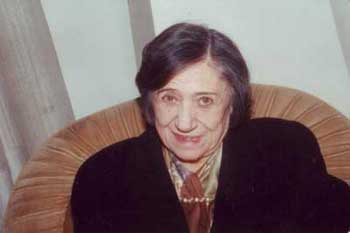Hind Haroun, a Syrian poetess from the city of Lattakia, was born in 1927 to a family whose members resisted the French occupation for years and suffered greatly from its inhuman practices. Some of the family members were displaced, others were persecuted, imprisoned or sentenced to death, a thing that forced the poetess’s uncle Sheikh Monah Haroun to flee the country to save his life.
Poetess Haroun excelled in her study, she wrote poetry when she was in preparatory school and published her poems, at that time, in newspapers under the nickname of (Bint Alsahel). Haroun got a diploma of primary education, she worked as a teacher, then as the director of (Alkarama) Secondary School and later as the head of the Arab Writers Union in Lattakia.
Haroun wrote more than 4,000 poems on several themes like, homeland, love, maternity, sadness and land-man relationship. Her most distinguished collections of poems are: (The Temple Robber in 1977), (Diwan Ammar in 1979), ( Sun of Love in 1981), (Between Anchorage and Sail in 1984), and ( Ammar in the Conscience of Maternity).
The poetess experienced very tragic moments during the illness of her only son Ammar and after his death of cancer at the age of 17. This catastrophe inspired her to write unique poems lamenting her lost maternity and expressing the bitterness of losing a loved one.
On the beginning of her poetic career, Haroun once said: “I started to say poetry when I was a child and even before I knew how to write. In the beginning I wrote small innocent love poems and then moved to the nationalistic poetry which was a true revolution against the division of the Arab homeland, and a euphoria because of attaining Arab unity,” (namely the 1958 Unity between Syria and Egypt.)
She pointed out that in literature, there is no difference between women and men and “I wonder why people make this kind of distinction.”
“I don’t classify my works as women poetry as I can’t assess my position, but I admit that maternity poetry is more exclusive to women than men, and maybe I was distinguished in describing mothers’ feelings,” Haroun said.
She added: “Among the pioneer women poetesses who enriched the poetry movement in Lattakia were: Fatat Ghassan, Talaat Al-Rifai, Aziza Haroun, Fatma Haddad and Nabiha Haddad, the poet of pain and image.”
Poetess Haroun participated in many poetry festivals in Egypt, Lebanon, Morocco and France. She got honorary doctorate from the World Federation of Authors. Some of her poems were translated into French, English, Bulgarian and German.
The poetess spent her last years with her daughters and at school until she died in 1995.
Maysaa Wassouf

